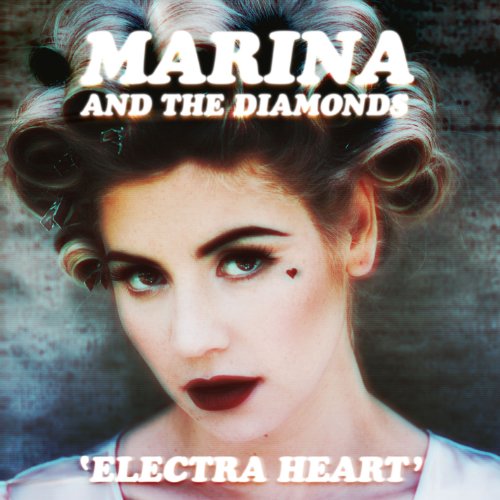
Marina and the Diamonds
Electra Heart
Release Date: Jul 10, 2012
Genre(s): Pop, Pop/Rock, Adult Alternative Pop/Rock, Alternative/Indie Rock
Record label: Atlantic
Music Critic Score
How the Music Critic Score works
Album Review: Electra Heart by Marina and the Diamonds
Satisfactory, Based on 10 Critics
Based on rating B+
She may not be a star here yet, but Marina Diamandis — whose second album recently bowed at No. 1 in her native U.K. — rivals Katy Perry for catchy hooks, commands with the swagger of Gwen Stefani, and even comes close to the ethereal vocal exhilaration of Florence Welch. Electra Heart‘s attitude-fueled dance tracks and rapturous ballads take inspiration from female archetypes, from ”Bubblegum Bitch” to ”Teen Idle.” On ”Primadonna,” she quips, ”You can count on me to misbehave.” And that’s just how we like her.
Based on rating 7/10
The second studio album from Marina Lambrini Diamandis finds the mercurial Welsh singer/songwriter assuming the role of diva in waiting, trading in the ballsy, quirky retro-pop of her 2010 debut, Family Jewels, for the glitzy (and still relatively ballsy) electro-thump pomp of Ke$ha and Lady Gaga. Produced by Dr. Luke (Katy Perry), Liam Howe (Sneaker Pimps), Greg Kurstin (Lily Allen), and Rick Nowels (Madonna), Electra Heart is a brooding, sexy, desperate, overwrought, and infectious record that's both aware and unashamed of its contrivance.
Based on rating 3/5
Last August, Marina Diamandis gave a confusing interview to the website Popjustice. She explained her change of direction, from the self-consciously arty singer-songwriterisms of her 2010 debut The Family Jewels – with its similarities to Sparks and Lene Lovich – to the more straightforward pop approach of Electra Heart, an album assembled by a selection of writers and producers for hire who have previously turned out hits for Ronan Keating, Dido, Katy Perry and Britney Spears. The shift was so radical, she said – "the antithesis of everything I've done so far" – that she had created a character to perform the new material, called Electra Heart, whose videos had a "Mulholland Drive/Paris, Texas vibe": cue footage of Diamandis in a blond wig and pastel-shaded 50s clothes, smoking insouciantly and trashing sleazy motel rooms with her bad-boy boyfriend.
Based on rating 5.9/10
In Marina Lambrini Diamandis' oft-cited comeback interview with Popjustice last August, she introduced the concept that would lead into her second album: that of Electra Heart, a kind of not-quite-alter-ego/character/affectation/cinematic simulacrum that would feed into the follow-up to her 2010 debut LP as Marina and the Diamonds, The Family Jewels. Representing Greek tragedy, the "loss and failure" side of the American Dream, a daddy complex, and the vacuity apparently lingering inside us all, over six months prior to the eventual release of the LP there was very much a feeling of Marina over-complicating the whole affair: trying to dress up the high-gloss record that she had made with Katy Perry's collaborators (seemingly at the behest of her major label) in layers of philosophy, mythology, artifice, and blonde wigs. (There's a babyish song here called "Hypocrates", misspelled for seemingly no good reason, and with no reference to the philosopher in the song.
Based on rating 2.5/5
Ever since she began, Marina Diamandis has battled with the idea of what it means to be a female pop star. In 2009, she famously blogged about Shakira’s ‘She Wolf’ video, chastising the Colombian singer’s skimpy outfits and cage-dancing. A line in that post seems prescient now: “The reason why I loved Shakira originally was for her strength, self respect and intellect.
Based on rating 5/10
Smart pop, in 2012, is practically the definition of a high-wire act. Rely on the supposedly throwaway nature of the medium too much and you'll float away with nobody caring; try and temper it with too much knowing and smarts and the whole thing comes crashing down. So where does Marina and the Diamonds' Electra Heart, with its alter-egos and concepts a-go-go, find itself in relation to the tightrope? The headline is: pop concept album about a pop star called Electra.
Based on rating 2/5
A self-proclaimed DIY pop star with equal amounts of love for Britney Spears and Daniel Johnston, British singer/songwriter Marina Diamandis takes aim at American consumer culture by embracing the conventions of its most marketable music. On her debut, The Family Jewels, this tactic resulted in an interesting but uneasy disjuncture that becomes increasingly problematic on her sophomore effort. On Electra Heart, Diamandis trades her cabaret post-punk vocal histrionics and thrift-store chic for an unconvincing Jacqueline Susann bombshell image and more overtly top-40-friendly sound courtesy of A-list pop producers Dr.
Based on rating 2/5
Off-kilter pop siren Marina Diamandis emerged out of Abergavenny via Greece in 2010. To say her second album is the subject of a big label push would be to understate the producerly firepower (Dr Luke, Greg Kurstin) flung at Electra Heart, an album concerned with love, identity, femininity and America. All that topspin allows the quirky Diamandis to make pumping glitz like Britney or Katy Perry while retaining some ironic distance, as she does on "Power & Control", a rotten track.
Opinion: Very Good
Balances the ironic and the heartfelt, the real and the fake, with remarkable aplomb. Michael Cragg 2012 Marina Diamondis, aka Marina and the Diamonds, doesn't make things easy for herself. For her follow-up to 2010's excellent debut The Family Jewels, she's created a sort of semi-concept album about female identity, focusing on various character types (Bubblegum Bitch, Homewrecker, Teen Idle etc) and disseminating their traits over throbbing electropop and plaintive piano.
Opinion: Poor
The titles alone cause almost physical pain. 'Primadonna' bodes awfulness. The self-aware self-obsession, the nod to Madonna in a year that she herself releases an album called MDNA (because what is it to be a female icon? I'm just worried that no one's really spent enough pop-hours pondering this question). Or Electra Heart itself, with its deathly boring promise of daddy issues.

